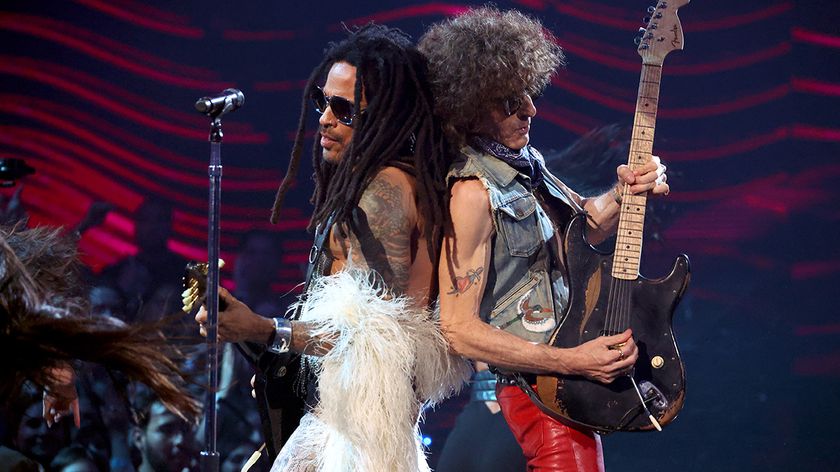Jaguar Jonze: “The guitar, to me, is like a second set of vocals”
On her equally propulsive and poignant debut album, Jaguar Jonze sends her troubled past up in flames and blazes a bold trail for her future to shine on

Pandemic be damned, the last two-and-a-half years have been incredibly hectic for Deena Lynch, better known today as the inimitable Jaguar Jonze. She dropped her debut EP under the moniker, Diamonds & Liquid Gold, in April 2020 – midway through her own perilous battle with COVID-19, no less – and by the year’s end, the Brisbanite had firmly established herself as one of Australia’s most powerful creative forces.
Splitting her time evenly between music, her activism for survivors of abuse and marginalised communities, and her various other creative endeavours (ie. digital art as Spectator Jonze and photography as Dusky Jonze), Lynch powered into 2021 with the Antihero era. Fleshing out the world of Jaguar Jonze with a commanding swagger and a fearless bite, it was arguably one of the best releases in a year packed from start to end with bangers. It raised a question we were desperate to see answered: “What could this woman do with the freedom of a whole album?”
Enter: Bunny Mode, an 11-track eruption of passion, power and personality. It chronicles the first stint of Lynch’s journey as Jaguar Jonze, but also looks further inwards, reckoning with demons she fought in her youth to regain control of her labyrinthine psyche, and making it impenetrably clear that new demons will have their heads torn clean off their shoulders if they dare to even think of striking.
With the record out and dropping jaws all around the world, Australian Guitar caught up with Lynch to vibe on everything that makes Bunny Mode – which she made alongside her band, Aidan Hogg (co-producer/synths/bass), Joseph Fallon (guitar/string arrangements), Jacob Mann (drums) – such a striking listen, and how even the instruments that went into making it were a labour of love.
In the Spotlight column you did for us in AG #147, you said: “I’m self-taught and use guitar as a vehicle for singing, songwriting and expression so I only ever learn what I need to do at a minimum.” With this album in particular, what new techniques did you bring to the table?
I think you can really see that [my approach to] the guitar has evolved on this album. I’ve come to realise that my music is so heavily weighted on vocals, but also on the guitar parts. Because the guitar, to me, is like a second set of vocals. I use my vocals as an instrument and as part of the arrangement, but in the same sense, I love my guitar to take the same kind of presence that a lead vocal would over a bed of other tracks.
So with Bunny Mode, I wanted to push that. I think we were trying to be more annoying with the guitar sometimes, to be honest – like, we wanted it to be chaotic and confronting, really take up space and grab your attention. It had to be ear-piercing, but it also had to be buttery and beautiful, because I wanted to show the breath of the guitar; I wanted to show that it can be used like a vocal.
Even when the guitar is used minimally, there’s a lot of force there. Like on ‘Know My Name’, where at times, there’ll just be one note ringing out, but it feels so impactful.
Yes! Thank you! I am really annoying in the studio – the theme of this interview is that I am annoying [laughs] – but I always talk about conviction and intention, like, “Does this [part] need to be here? What purpose is this serving?” And that’s why you hear, in a lot of my tracks, the lead guitar is shredding to three notes, or the same note in a two-bar setting, and it says so much more than a big shredding part would.
Get The Pick Newsletter
All the latest guitar news, interviews, lessons, reviews, deals and more, direct to your inbox!
It also allows for us sit in that atmosphere a little bit longer, and really let it take effect. I like that you brought up ‘Know My Name’, too, because that was one where I was being really intentional with the guitar. It’s like, I’m being very commanding with my lyrics, and I want to let the guitar just be a facilitator in that conversation.
That’s something where your influence from film soundtracks comes into play, right?
Yeah, definitely. I think film scores are meant to evoke emotion – they exist to suit the scene. And that’s what I want with the guitars, to suit the scene of the story I’m trying to tell, or amplify the message I’m trying to convey. I love that composers are really considered with the way they arrange tracks and write film scores, and I am really inspired by that as well.
As for the guitars themselves, what can you tell me about Dingo?
Okay, so I made this guitar from scratch, and I intentionally wanted everything to be from Queensland. The body is made from Queensland blackwood, and it’s so beautiful. And I didn’t want to put any resin or lacquer or anything on it, so I’ve just gone with pumice and beeswax – it’s like a very natural, matte-satin finish. The fretboard is rosewood, and then the nut and bridge are made from the bones of cows that died naturally in farms.
And then the inlays – one of them is a little bunny rabbit, because I used to have a pet rabbit, and she was my best friend, so she lives up on the 12th fret. And the headstock has “DEENA” written out in mother-of-pearl. But the thing is, I flat-out refused to use CNC lasers – I wanted everything on this guitar to be done by hand, so I literally filed each letter out and drilled it into the bed of the wood myself… I’ll never make a guitar again, it was so laborious [laughs]. It has all these little imperfections, but I actually love that. I’m very much an imperfectionist’s perfectionist.
Is it more gratifying to you, coming up with a hook or writing a song on a guitar that you put your blood, sweat and tears into?
Absolutely! I have never played that guitar live, because I am so adamant that if I was to play it onstage, I would need a strap, and I have to make that strap by hand as well. But every song I’ve ever made has been written on that guitar. For me, Dingo is this device that allows me to be 100 percent grounded and present, because it’s something I poured so much of myself into – and that gets carried on through to my songwriting.
It’s like this weird spiritual connection I have, where it allows me to go deep into my emotions and my soul, and what’s important to me, and let that come through in my songwriting… And then I guess I’m probably a creature of habit as well.
Was Dingo the first guitar you’d ever built?
First and last [laughs]. It was a full-time job for two weeks, but I didn’t get it done in those two weeks, so then it was every weekend for the following three months. It was strenuous, but it was an amazing process because I learned so much about the guitar. It’s such a beautiful craftsmanship – I have so much more respect for luthiers around the world, and what they do. And not only luthiers, too, but guitar techs as well. My partner, Will Cunliffe, is a guitar tech for Dua Lipa, Crowded House, Angus & Julia Stone, etcetera – and I appreciate so much more of what he does on the job, which I probably didn’t take note of before or just always took for granted.
There is such a beautiful art form behind the woodwork and the building of guitars. Even the electronic side of it! But yeah, it’s definitely not for me with my level of patience [laughs]. I actually have this other really cool guitar that someone made for me, which I got sent from Frisina Guitars in Austria. He’d just had taken note of who I was as an artist, and thought it fit the attitude of Jaguar Jonze, and he totally nailed it. It’s beautiful. And it’s made from recycled skateboards! I’ve been very blessed to have all of this amazing artistry around me, in every facet of my music and career.
Long before you even start thinking about the music, there’s so much artistry and creativity involved.
Totally. Even putting together a pedalboard is an art form of its own. I’ve tried making my own pedals, too – that is also not for me [laughs]. But the reason I try making all of these things is so I can understand where it comes from. I think it’s really important to see where everything sits in the grand scheme of things – I don’t want to dissociate, or be disconnected or detached, from where my art comes from. I always try to be grateful for everything in front of me, and never take anything for granted – like the guitar I play on or the pedals I play it through.
Tell me about the pedals you’ve made!
One of them is still on my board! I didn’t really grow up with my dad, but when I found and reconnected with him when I was 18, I found out that he was also an engineer. He lives in Japan, and Akihabara – the “electric town” – is his favorite place in the world. His kitchen looks like a Jaycar: there’s plastic tubs of electronics everywhere, and all these random gadgets sprawled out over every surface. So the first time I built a pedal was with him, and it was a really great bonding experience. We built a digital delay. I tried to do another one on my own, which was an eight-bit fuzz, but that’s broken now.

Ellie Robinson is an Australian writer, editor and dog enthusiast with a keen ear for pop-rock and a keen tongue for actual Pop Rocks. Her bylines include music rag staples like NME, BLUNT, Mixdown and, of course, Australian Guitar (where she also serves as Editor-at-Large), but also less expected fare like TV Soap and Snowboarding Australia. Her go-to guitar is a Fender Player Tele, which, controversially, she only picked up after she'd joined the team at Australian Guitar. Before then, Ellie was a keyboardist – thankfully, the AG crew helped her see the light…

“We had 15 minutes left, and it was time to go… I just started playing that riff. Then Lenny goes, ‘Whoa, what’s that?’” Lenny Kravitz guitarist Craig Ross reveals the serendipitous roots of a Kravitz classic

“The concept of the guitar duel at the end was just appalling”: Crossroads is an essential piece of '80s guitar lore, but not every guitar legend was a fan of the film








